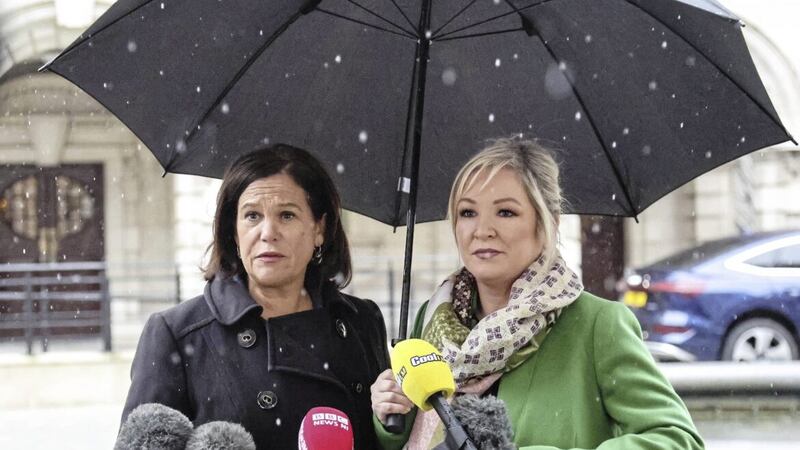Diplomatic protocol was cited after the NIO refused to let Mary Lou McDonald attend talks on the Brexit protocol and the Stormont deadlock.
Foreign secretary James Cleverly said he could not meet the Dáil opposition leader before meeting Micheál Martin, his Irish opposite number, in Hillsborough the next day. This looks like a convention that should only apply on trips abroad - a minister in their own country ought to be free to meet foreign visitors in any order. So perhaps it is unionists who should have been affronted.
The government added Ms McDonald has not always attended Stormont talks or briefings from UK ministers. While that is true, in June 2021 the Sinn Féin president travelled to Stormont to personally arrange a deal on Irish language legislation at Westminster with the secretary of state and DUP leader Edwin Poots, before permitting nomination of a first minister. The only consistent point left after this tangling of the strands of the Good Friday Agreement was that everyone can always meet anyone.
**
SDLP assembly leader Matthew O’Toole refused to attend the NIO talks due to Ms McDonald’s exclusion. Earlier that day, he had unveiled an SDLP plan to change Stormont’s rules so a speaker can be nominated on a two-thirds majority, removing the DUP’s veto. But this would still require the UUP to turn up. All ideas to remove vetoes presume the UUP and SDLP would not join DUP or Sinn Féin boycotts through community solidarity - or fear of appearing to break solidarity.
The NIO’s bungled meeting may not have been an occasion for the SDLP to leave Sinn Féin unsupported. However, a demonstration of independence would be timely. Assembly recalls did not work during Sinn Féin’s three-year walk-out because the SDLP refused to turn up.
**
Belfast High Court has rejected a landmark legal challenge by two women over hospital waiting lists. Both claimed the health service breached its legal duties and the rights of patients by failing to provide necessary care in a reasonable time.
The judge agreed the health service is in crisis but ruled only politicians can fix it. Problems “caused by resource issues or strategic issues, or a combination of both is not something which can be measured by a legal standard. That is not a judgment which the courts can make.”
This is a significant verdict for Northern Ireland’s rights sector, which has long argued the courts should enforce ‘economic and social rights, including healthcare, at a fairly detailed decision-making level.
**
Problems are emerging with Northern Ireland’s new online planning portal, commissioned by the Department for Infrastructure in conjunction with 10 of the 11 councils. Architects testing out the system, which should have been operational three years ago, report it is an unusable mess that lacks key features of the website it replaced. This is a terrible omen for the health service, as every proposal for health reform involves IT projects vastly more complex than sharing 12,000 planning applications a year between fewer than a dozen public bodies.
Even an idea as apparently straightforward as letting pharmacists write some prescriptions would mean sharing Northern Ireland’s 1.9 million patient records and 43 million annual prescriptions between 321 GP practices, 526 pharmacies, four health trusts and the Department of Health.
How late would that project run?
**
An IT project was the reason for James Cleverly’s visit to Belfast, as has been forgotten in the Sinn Féin fuss. The foreign secretary came to brief parties on the first breakthrough in protocol talks, with London granting Brussels access to its live sea border database and Brussels accepting the system meets its needs.
The database was a major undertaking and getting it operational in two years is an achievement that should be acknowledged. Still, it is essentially a small version of the UK’s pre-existing trade system, with new checks against ferry manifests and vehicle movements in ports. It was not built from scratch.
**
The concentration of three-quarters of Northern Ireland’s students in Belfast is “staggering” and “intolerable”, worsening the effect of “historic underinvestment” in Derry. So declared Professor Gerry McKenna of the Royal Irish Academy, during a presentation he had been invited to give to Derry and Strabane Council on regional development.
This can only have burned the ears of former Ulster University vice-chancellor Sir Richard Barnett, who moved the Jordanstown campus to Belfast and once said he was “fed up” with Stormont’s attempts to redistribute students to Derry.
Prof McKenna was Sir Richard’s predecessor as vice-chancellor of the university.
**
The UK media is having a classic ‘historical cancelling’ debate after a London primary school dropped Sir Francis Drake from its name due to his links to slavery. In the newspapers, some historians claimed Sir Francis should be remembered for liberating slaves, if only to recruit pirates and annoy Spain. The BBC was having none of it, describing Sir Francis bluntly as “a slave trader” in a piece it later had to re-write, upgrading him to “16th century explorer”.
There was no space in any of this coverage to mention Sir Francis’s gratuitous massacre of the entire 400-strong civilian population of Rathlin Island in 1575. That still appears to be fine for a national hero.








